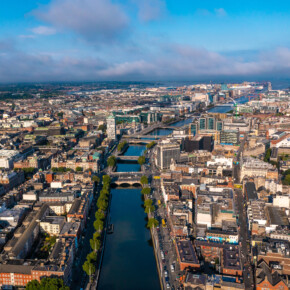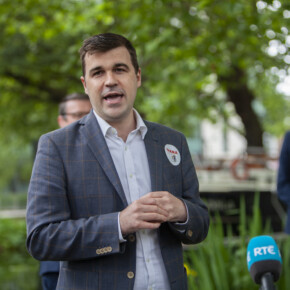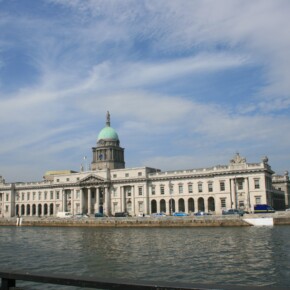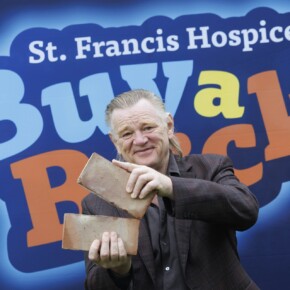Dead Interesting
Dublin People 15 Mar 2014Sargent Major Martin Doyle
IN GRANGEGORMAN military cemetery there stands a headstone to company Sargent Major Martin Doyle, winner of the Victoria Cross and an IRA man.
Doyle was born on the 25th October 1891 in Gusserane, New Ross Co Wexford. His father, Larry Doyle, and the family worked the land and when Martin was still a boy they moved into New Ross town.
After leaving school, Martin worked with a local farmer, but on St Stephen’s Day 1909 he joined the Royal Irish Regiment, claiming to be 17 though he was in fact only 15.
Showing an inclination for soldiering he was sent to India where he advanced himself, attending night classes and courses whenever possible. Good at sports, he became the Regimental novice lightweight champion in 1913.
At the outbreak of war in 1914 Martin was recalled home with his regiment and transferred to the Royal Dublin Fusiliers who embarked to France as part of a British expeditionary force on the 19th of December 1914.
Martin’s leadership was soon recognised and he was promoted to Sergeant in 1915. He survived the slaughter at Le Mons and rose though the ranks to Company Sergeant-Major (CSM), and transferred to the 1st Battalion, Royal Munster Fusiliers.
CSM Doyle won his first medal for bravery, the Military Medal, on 24th March 1918, while serving at Hattenfield in France.
His unit was in reserve when the front-line troops were driven back by the Germans. Called in to restore the situation, the Munsters recaptured Hattenfield and then advanced towards the trenches outside the town.
Skirmishing with the enemy, they soon came under sustained, deadly machine-gun fire from a derelict barn situated in a ‘no-man’s-land’ between them and the Germans, a mere 40 yards away.
Calling for volunteers, CSM Doyle led a bayonet charge on the barn. Reaching it alone, he routed the Germans, seized the machine-gun and took possession of the farm building.
Some time later he was captured by the enemy and although roughly treated, was released by a successful counter-attack by his regiment.
The Wexford soldier was to display even greater bravery six months later near Riencourt when on 2nd September 1918, he became a select band of Irishmen to merit the Victoria Cross for
‘conspicuous bravery’.
The official announcement read:
“When command of the company devolved upon him consequent upon officer casualties, and observing that some of his men were surrounded by the enemy, he led a party to their assistance, and by skilled leadership worked his way along the trenches, killed several of the enemy and extricated the party and carried back, under heavy fire, a wounded officer to a place of safely.
“Later seeing a tank in difficulties, he rushed forward again under intense fire, routed the German troops, who were attempting to commandeer it, and prevented the advance of another German party.
“A German machine gun now opened fire on the tank at close range, rendering it impossible to get the wounded away, whereupon Doyle, with great gallantry, rushed forward, and single-handed silenced the machine gun, capturing it with three prisoners.
“He then carried a wounded man to safety under very heavy fire. Later in the day when the enemy counterattacked his position, he showed great power of command, driving back the enemy and capturing many prisoners.
“Throughout the whole of these operations, Doyle set the very highest example to all ranks by his courage and total disregard of danger.
?
After the war ended, Martin Doyle was welcomed home in New Ross in March 1919. His proud parents and a large crowd of soldiers and townspeople greeted him at the railway station.
Martin retired from the British army in July 1919 and joined the IRA when the Irish War of Independence was at its height. He became an intelligence officer in the Mid-Clare Brigade, and was active throughout 1920 and 1921 in Ennis.
On at least one occasion he was under such suspicion that he considered taking to the hills with his rifle. On another occasion he went to Kilrush on a mission and, due to misinformation, almost fell into a trap.
During the Civil War he served with the Free State Army in Waterford, Kilkenny and South Tipperary. He was wounded in the left arm in Limerick in the fighting there in early 1923.
After the Civil War he remained with the army until he retired in 1937, now married with three daughters, he took up pensionable employment in the Guinness Brewery as a security officer.
Alas, he was not destined to enjoy his hard-earned retirement. Stricken with polio, he died on 20th November 1940, in Sir Patrick Dun’s Hospital, Dublin, aged just 46.
The old soldier Martin Doyle rests in peace in Grangegorman British Military burial place, off Blackhorse Avenue near McKee Barracks, Dublin, under a headstone erected by comrades of his old regiment.











